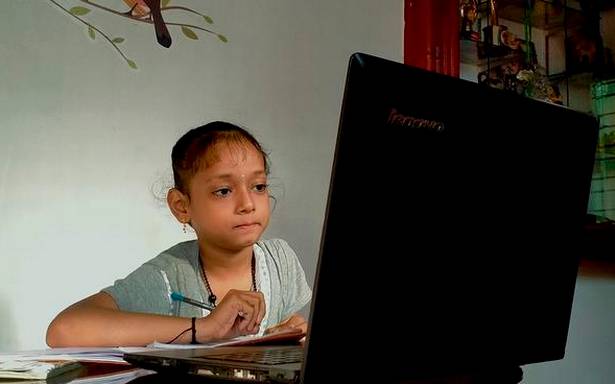Govt cancels in-person classes till 9th standard
The forceful resurgence of the COVID-19 pandemic has forced the government to cancel in-person classes for students up to the ninth standard till January 21.
A pandemic review meeting chaired by Chief Minister Pinarayi Vijayan asked schools to switch to remote online learning, up to the ninth grade, until further orders.
After a week, the government would review the educational disruption caused by the highly contagious Omicron variant driven re-infections.
If the pandemic showed no sign of abating, the government would put off the resumption of in-person learning for school children up to the ninth grade until the second week of February.
Mr. Vijayan requested the Department of Health to expedite the 10th to 12th standard vaccination by expanding the inoculation drive to school campuses.
The government also gave school principals and headmasters authority to shut down their institutions for two weeks if an infection cluster developed in the precincts.
The administration has ruled out weekend lockdowns and night curfew for now. It has not restricted outdoor and commercial activity.
The government has limited attendance at marriages, funerals, social and political events to a maximum of 50 in districts that report a test positivity rate higher than 20.
Nevertheless, organisers could seek special sanction from the district administration to admit more than 50 people to group events on a case to case basis.
(As of Friday, Thiruvananthapuram and Ernakulam have the highest COVID-19 cases).
If the TPR climbed to more than 30, the district administration would ban gatherings and social events.
The government has asked shopping malls to restrict visitors. The number of customers allowed in a mall, supermarket, textile or jewellery shop at a time should not exceed the total floor area of the establishment divided by 25.
District administrations should deploy sectoral magistrates to ensure businesses adhere to the COVID-19 protocol.
District collectors should proactively detect COVID-19 clusters and lock the hotspots down. The Health department should share COVID-19 data on a real-time basis via the e-jagratha portal with the State police, Revenue and local self-governments.
The administration instituted work from the home facility for pregnant government employees.
Mr. Vijayan counselled the public to hold get-togethers, meetings and other group events online.
He also insisted that citizens wear masks and observe the physical distance to stave off the possibility of more stringent pandemic control measures. There was no ground for complacency.
Shops, restaurants and other essential services should, optimally, switch to online sales and home delivery.
The government counselled the Travancore Devaswom Board (TDB) to advise Sabarimala pilgrims who have booked their darshan in advance to postpone their visit till further notice.
Mr. Vijayan also asked local bodies to organise ward level committees to spearhead the State’s contagion mitigation measures. It requested the Department of Health to vaccinate 10th and 12th standard students at schools.
The meeting appeared to have hinged its decisions on the arguably lower severity of the illness and reduced hospitalisation and mortality rate.
The high vaccination rate, sufficient stock of supplemental oxygen and ventilators, and surplus hospital beds seemed to have prevented the government from imposing harsher restrictions on daily life and business.
The government also seemed acutely aware of the economic fall out of partial lockdowns and night curfew. Hence, the administration’s current thinking was to isolate infection clusters at the neighbourhood, institutional and household level and allow regular activity outside the hotspot.
The restrictions (not more than 50 per cent of the total capacity) of seating in cinema theatres, public transport and restaurants remained in force.
Source: Read Full Article

